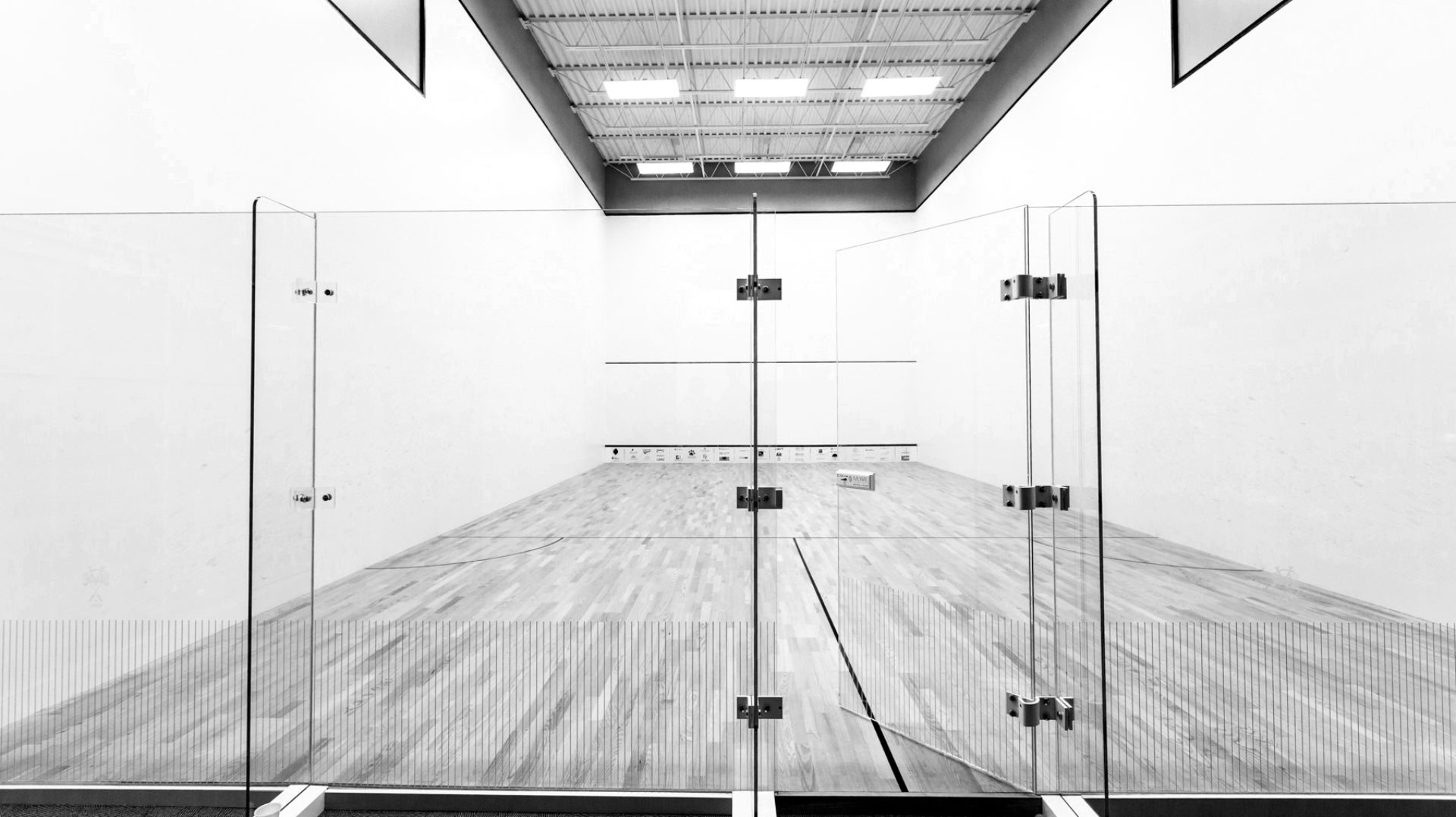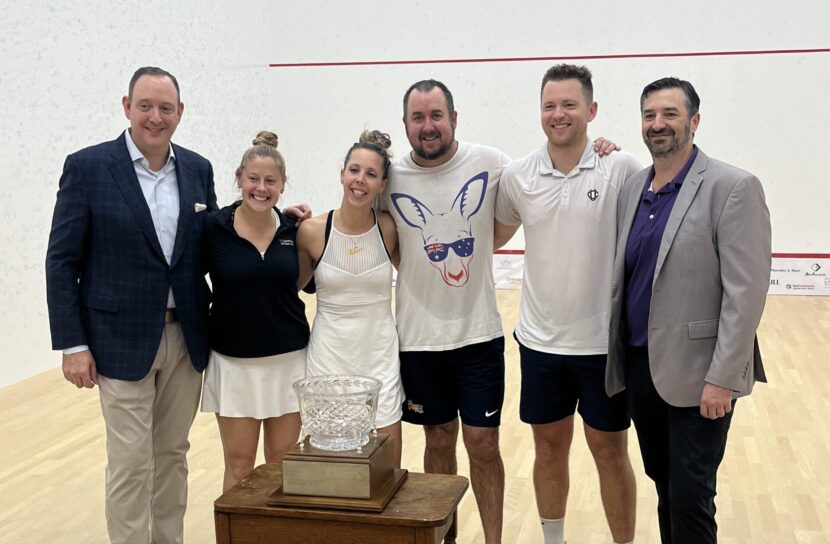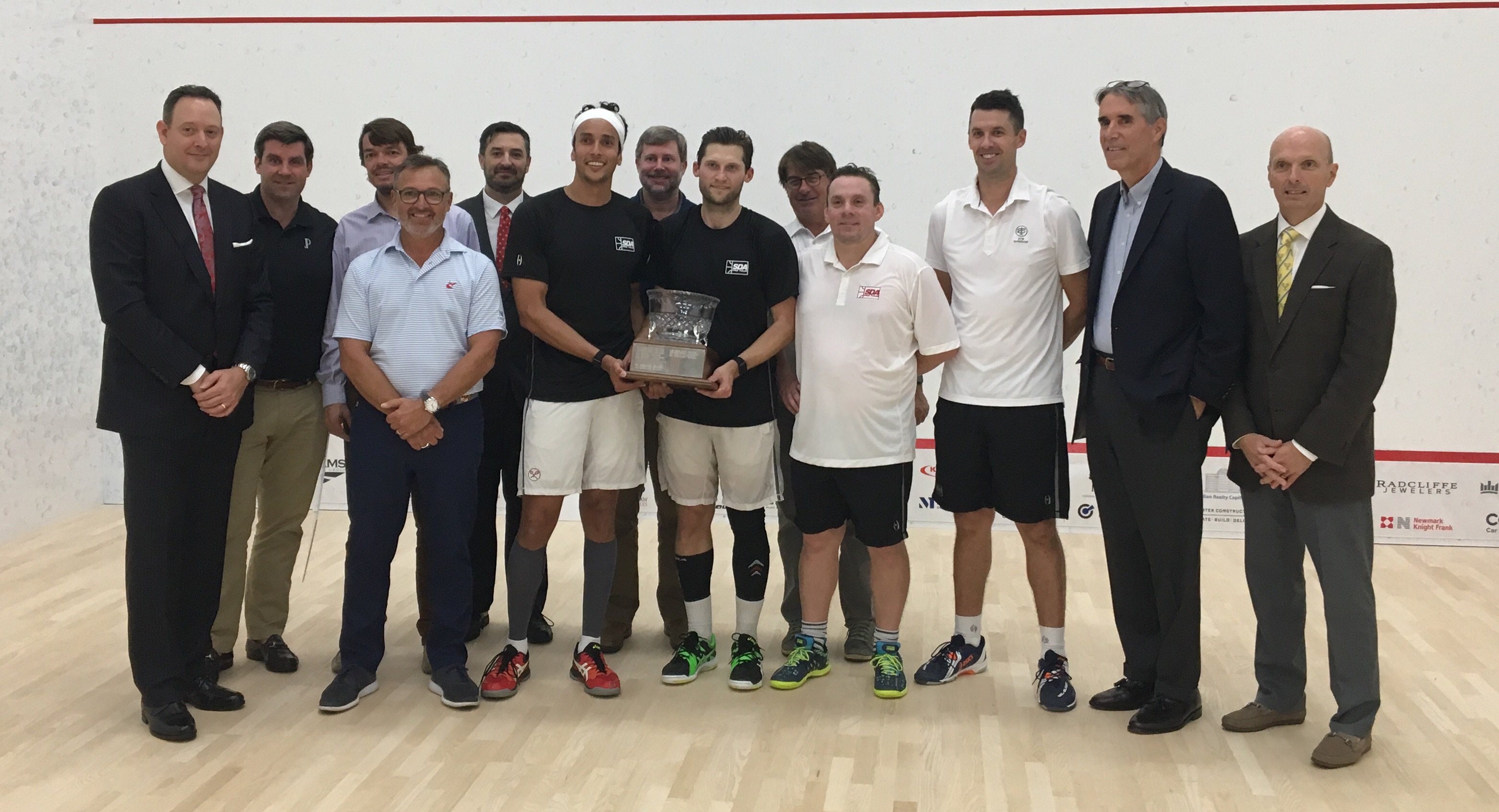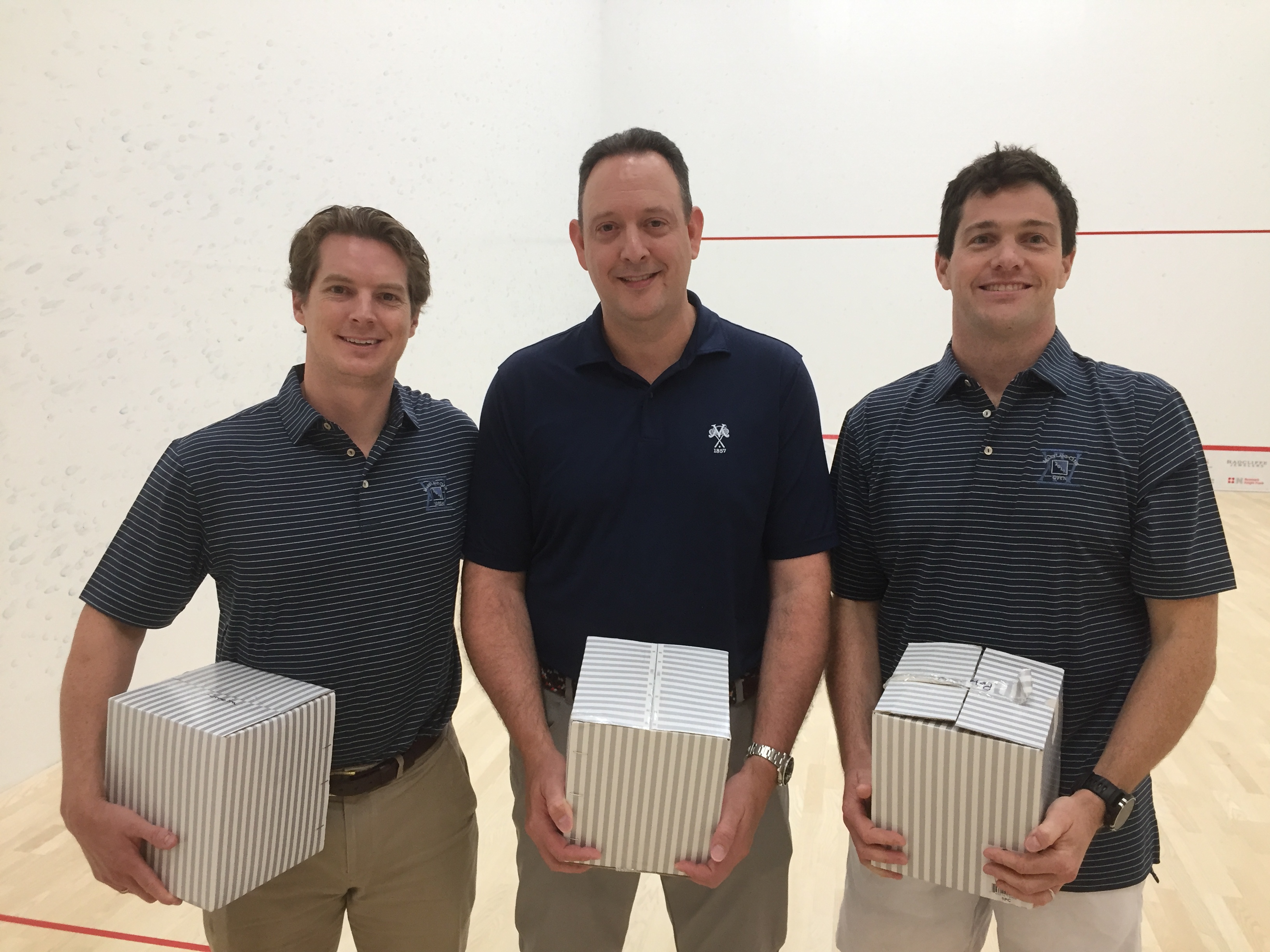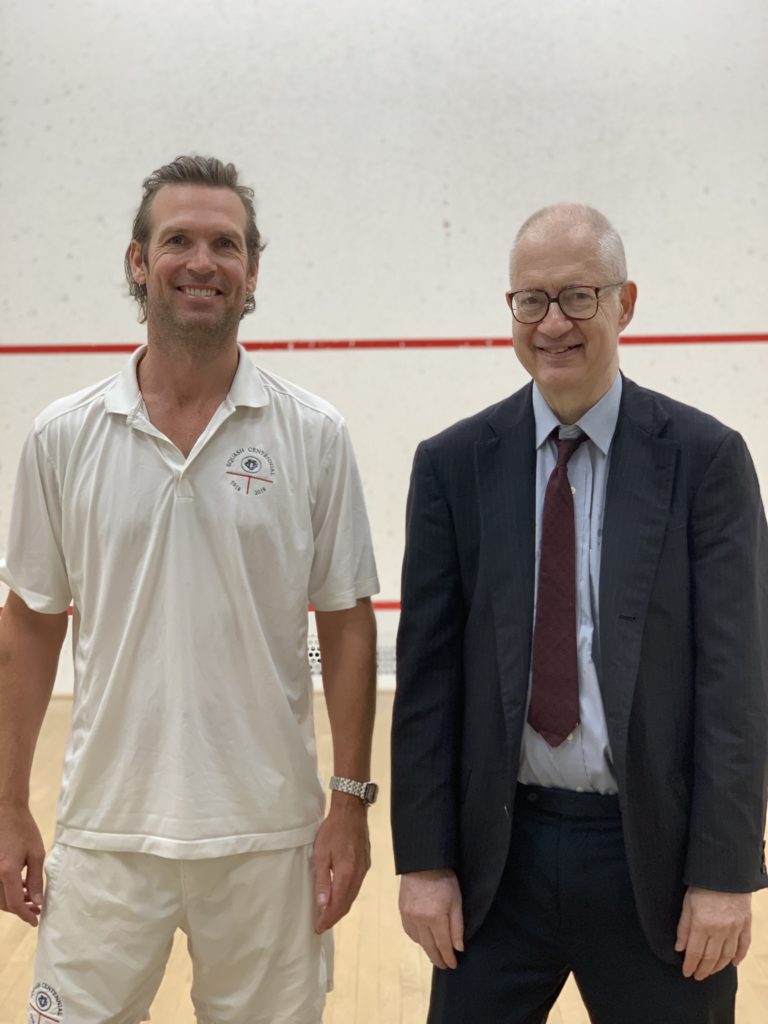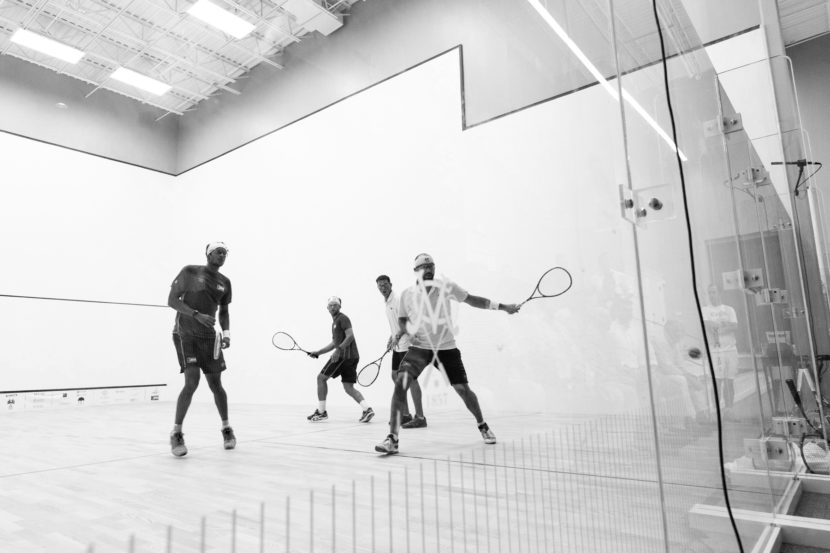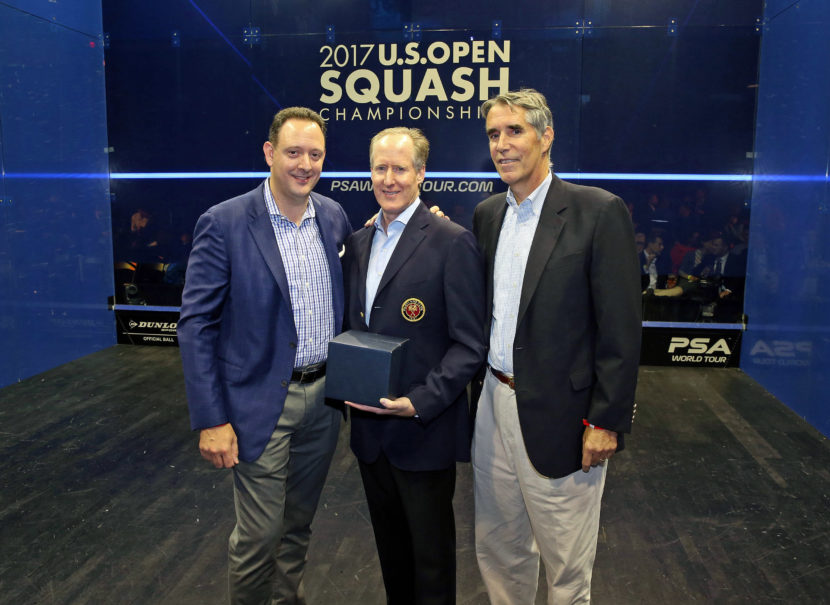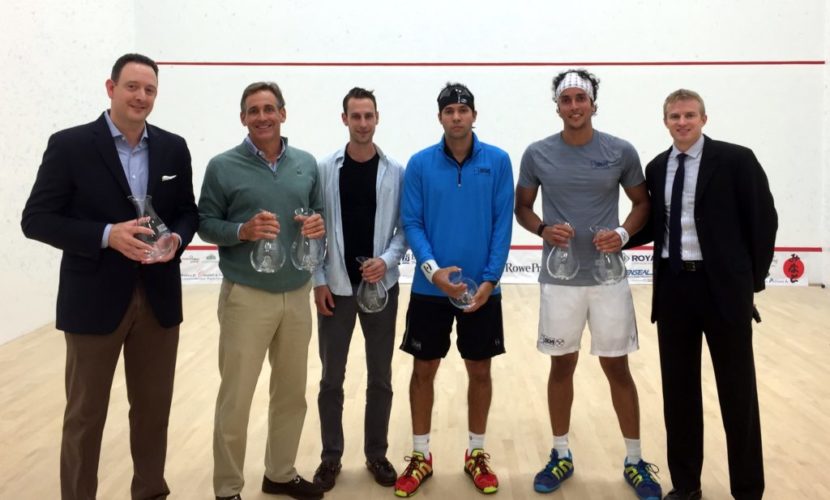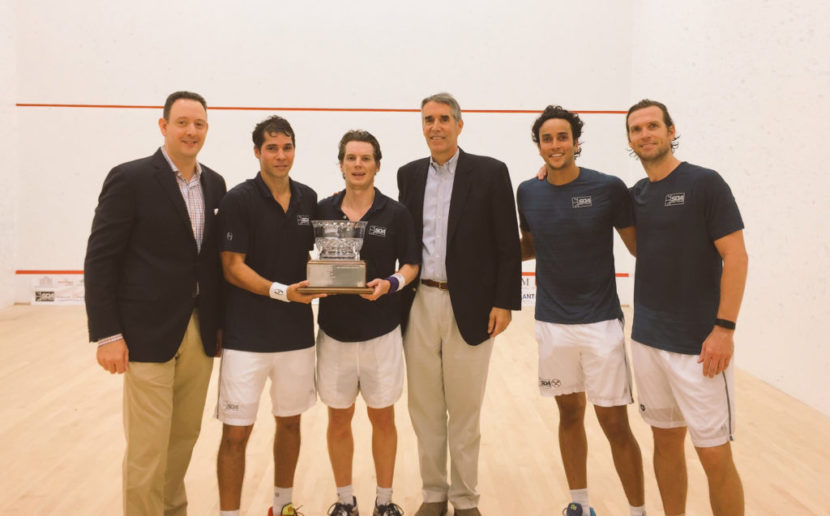A Retrospective Look At The 2024 Maryland Club Open
By Rob Dinerman
On the first weekend of October 2024 the Maryland Club Open (MCO) returned to the Squash Doubles Association (SDA) schedule after a five-year hiatus due to the Covid pandemic that shut the SDA tour down for nearly two years, followed by Baltimore’s hosting of the 2023 Can-Am competition — and a memorable and triumphant return it was! This latter phenomenon is fully in keeping with an MCO tradition throughout its prior 16 editions of playing host to a major upset, an eleventh-hour comeback, an intriguing back-story or a landscape-changing result — sometimes (as in 2024) all four! For the first time in the history of this tournament — whose inaugural holding took place more than two decades earlier in October 2003 — there was a women’s pro event (possibly related to the club itself having gone co-ed in 2021, 167 years after its founding as a men’s-only club in 1857), as well as a men’s Challenger draw.
The foremost protagonist in this past autumn’s Charm City drama was the first-time pairing of John White, a former PSA No. 1 who was entering his 15th year as the Head Men’s and Women’s Squash Coach at Drexel University, and David Letourneau, the 2011 recipient of the Skillman Cup, the most prestigious award given to a men’s college squash player. This pair hadn’t even initially entered the event as partners, but they wound up engineering the biggest match-ball-saving comeback of the entire 2024-25 season en route to the winner’s circle! Their only previous time on a doubles court together had been when they competed against each other in a Philadelphia-area A League match one year earlier — during which White and Gina Stoker, representing the Cynwyd Club, out-played Wilmington Country Club torch-bearers Letourneau and former Cornell player Owen Butler — and the only reason that White and Letourneau wound up as partners in Baltimore was that Letourneau’s original partner, Josh Hughes, was forced by a scheduling conflict to withdraw.
AN ABSOLUTE CLASSIC
Notwithstanding the sparseness of their prior exposure to each other, White and Letourneau straight-gamed Matt Jenson and Thomas Brinkman in their opening-round quarterfinal match, while Ashley Davies/Lockie Munro and Henry Parkhurst/Carter Robitaille were doing the same to Santiago Orozco/Nathan Snyder and Maryland Club members Dave Rosen/Taylor Tutrone respectively. In the remaining quarterfinal Sam Fenwick and Chris Longman prevailed in four games against Anderson Good and the host club’s Head Teaching Professional Mark Price. The top-half semifinal saw Davies and Munro defeat Parkhurst and Robitaille by a competitive but convincing 15-10, 9 and 13 score (when Davies dead-rolled a forehand three-wall on the final exchange), but the balancing Letourneau/White vs. Fenwick/Longman semi turned out to be an absolute classic.
In each of the first three games the team that eventually won did so after trailing 14-13. Fenwick accounted for the end of the first game’s pair of winners with a sharply-angled backhand roll-corner followed by a blast right at White (who was stuck close to the front wall) that he couldn’t fend off. At 13-14 in the second game, Longman nailed a forehand overhead (perhaps his favorite shot) into the front-left nick, following which his partner Fenwick hit a backhand roll-corner that Letourneau dived towards the front wall for but was unable to retrieve. Now leading two games to love, Fenwick and Longman got to 14-13 (double-match-ball) when Fenwick lashed a forehand cross-court at Letourneau, who tinned his attempted return. But on the ensuing exchange, Letourneau circled around an over-hit Longman cross-court and carved a daring forehand drop-shot winner to the front-right that barely eluded Longman’s racquet. At 14-all, with Fenwick sprawled on the ground after an “emergency” retrieval, Letourneau hammered a forehand cross-court into the open space to salvage that game and keep his team in the match.
Perhaps a bit deflated by their inability to finish off the third game, Fenwick and Longman started the fourth slowly, falling behind 9-3. They then staged a praiseworthy rally that closed the gap to 10-8, but at that juncture Letourneau/White won the last five points of that game —on a tinned Fenwick reverse-corner, a stroke call against Longman, a well-placed Letourneau cross-court winner, a great get-and-re-drop by White and a Letourneau backhand drive that died at the back wall — and the first three points of the fifth game as well. However, at that juncture, Fenwick and Longman righted themselves by winning 13 of the next 18 points. The second-last of those was an all-court, 51-hit rally that ended when White, who had an open ball up front (after Fenwick had been forced to hit the ball into the back wall in order to return it), smoked a forehand cross-court into the tin. Losing such a crucial point in that fashion had to have been especially demoralizing (indeed both White and Letourneau dropped their racquets in dismay), and even more so when Fenwick then followed up with a backhand drop-shot winner that put his team ahead 13-8.
14-9
Letourneau then hit a winner past Fenwick but a stroke call against White along the right wall gave Fenwick/Longman six match-balls at 14-9. However, when Letourneau and White won each of the next two points almost immediately — on a Letourneau serve-return that clung too closely to the left wall for Fenwick to scrape it back, followed by a Letourneau backhand straight-drop winner very early in the following point — the score had swiftly closed to 11-14. Letourneau and White, both long-time veterans of the squash wars, seized that little bit of momentum with a pair of winners on the right wall by White (first on a shallow shot, then a drive to perfect length with Longman stuck on his left hip) sandwiching a Longman tin to tie the score at 14-all. White bounced the ball twenty-five times before serving on simultaneous-match-ball. Two lets later on the match’s determinative exchange Fenwick’s attempt to drive a forehand cross-court past Letourneau — the same shot from the same spot on the court that he had successfully executed to get his team to double-match-ball in the third game — instead rang loudly off the tin, thereby ending the epic struggle 88 minutes (and four 15-14 games) after it began. Andrew Cordova, the host club’s longtime Racquets Director who has served as Tournament Chairman throughout the MCO’s existence, later called that match, for sheer effort and intensity, all combined with superb sportsmanship, the best he had ever seen.
The differing courses of the pair of men’s semis — Davies/Munro advancing to the final without losing a game, while the Letourneau/White pairing had been required to rally from two-games-to-love down and fend off a total of eight match-balls-against, including six in a row (neither of which latter pair of figures would be equaled throughout the remainder of the 2024-25 season) — would seem to have favored Davies and Munro. But Letourneau and White wended their way through a closely-contested first game (when White smashed a forehand cross-court that nicked in front of Davies at 14-12) and were for the most part in control throughout the 15-10, 15-8 remainder. The 51-year-old White, although weary from the lengthy semifinal and a little more than 20 years removed from the No. 1 PSA ranking he attained for two months in Spring 2004, was keeping his opponents deep and converting whenever he was presented with an open ball, constituting a perfect complement to Letourneau’s excellent reflex volleys and sharp angles.
They were joined as 2024 MCO champions by Gina Stoker and Nikki Todd in a women’s event that, like its men’s counterpart, had its most exciting and competitive match occur in the semifinal round when No. 1 seeds Kayley Leonard and Maria Elena Ubina, after splitting the first two games against Katie Tutrone and Suzie Pierrepont, won both the third and fourth 15-14. The third game’s simultaneous-game-ball point, which had an especially crucial feel to it, went on for 55 seconds and 27 hits — five of them Ubina forehand skid-boasts, an astonishing number for just one point — on the last of which the left-handed Leonard, whose winning volley one point earlier had brought the score to 14-all, angled off a forehand reverse-corner winner that even the fleet Tutrone, Leonard’s college teammate on Harvard’s national champion squads in 2015-16 and 2016-17, was unable to track down.
The fourth game, as noted, seesawed tensely all the way to the end stage as well. Trailing 12-11, Leonard and Ubina ran off the next three points — on shallow volley winners first from Ubina and then from Leonard, followed by a Pierrepont tin — but then Ubina misjudged a deep-right ball and Tutrone squeezed off a risky drop-shot winner to tie the score at 14-all. However, on the following exchange, a Pierrepont backhand caromed well off the left wall, enabling Leonard to back Tutrone far over to the middle and guide a drop shot for a clear winner to the wide-open front-left portion of the court. Leonard and Ubina had defeated Marie-Victoire Wickers and Taryn Clary 3-0 in their quarterfinal match, while Pierrepont and Tutrone had won in four games over Tina Rix and Fernanda Rocha.
In the draw’s bottom half a highly anticipated quarterfinal match between the oldies-but-goodies Narelle Krizek/Steph Hewitt pairing and 2024 Boston SDA champs Line Hansen and her young Egyptian partner Jana Shiha — a 2024 SDA double-awards winner as both the Women’s Rookie of the Year and Most Improved Player — was prevented from happening when Shiha sustained a severe right-knee injury in a pro-am match earlier in the day that necessitated a major operation and sidelined her for the remainder of the season. Byed to the semis as a result of this unfortunate turn of events, Krizek and Hewitt, now 18 years removed from their run to the 2006 World Doubles title and more than a decade after capturing the 2014 U.S. National Doubles crown, played second seeds Stoker and Todd (first-round 3-0 winners over Ineta Hopton and Lauren Johnston) on even terms through the first half of the match, winning the second game 15-13 when Hewitt, who had earlier kept the point alive by racing over to the left wall, hit a nervy backhand cross-drop from fairly deep in the court that Todd didn’t see until it was too late.
COMPLETELY FITTING
But Todd then hit nine winners — mostly forehand reverse-corners but on some other shots as well, including one well-disguised lob when she caught both her opponents rushing forward expecting something short — in the 15-5 third game, and from 7-all in the fourth, a pair of Krizek tins were followed shortly by three consecutive Stoker winners, leading to an eventual 15-9 score-line. It was to be the final match of Krizek’s outstanding career — highlighted by eight U.S. National Open championships (four each in Women’s and Mixed Doubles) and three World Doubles crowns, exhibiting in the process a degree of longevity that can best be expressed by the fact that her last U.S. National Doubles/World Doubles title, the 2022 U.S. Women’s event, occurred a full 16 years after her first — prior to her retirement announcement in February 2025. It was completely fitting that her squash career ended in Baltimore, the same city where it all began 24 years earlier when she and her husband Rob Krizek were hired in 2000 as the Squash Pros at the Baltimore Country Club. Narelle Krizek had been inducted into the Maryland State Squash Racquets Association Hall of Fame in the same ceremony during which Cordova, the godfather to Krizek’s younger son Will, was similarly honored in 2011.
The key to Stoker/Todd’s 15-13, 11 and 11 final-round victory over Leonard and Ubina lay in their ability to conjure up game-deciding spurts during the stretch run of all three games. This was especially the case in the opening game, in which they trailed 13-12 but accepted a rare Leonard unforced error and then emerged triumphant from a 30-hit exchange that ended when Todd nailed a shallow forehand cross-court winner. She then sealed the game with an audacious forehand roll-corner from the deep-right, following which she and Stoker had a 10-2 run (from 4-8 to 14-10) that effectively decided the second game. During that prolonged rally their retrieving skills and constant defensive pressure elicited several Leonard/Ubina tins, all of them coming after long points. Similarly in the third game Stoker and Todd surged from 6-8 to 13-8 (seven straight points). Leonard and Ubina closed to 11-13, but Leonard then tinned a drop shot, following which Stoker slashed a backhand drive irretrievably down the left wall to clinch the outcome. The last point was one of many “scramble points” liberally sprinkled throughout all three games, nearly all of which (at least 75 percent) wound up in the Stoker/Todd column.
AN UNMATCHED DEGREE
To a degree unmatched by any of its 15 predecessors, themes that characterized the 2024 MCO continued to recur throughout the 2024-25 SDA campaign that followed. This was even true at the Maryland Club itself, which served as the headquarters for the early-March U.S. National Doubles, and during which Clinton Leeuw and Jaymie Haycocks staged a back-from-the dead comeback after trailing Steve Scharff and John Russell 2-0, 11-5 in the Men’s Open final that was eerily reminiscent of the Letourneau/White rally vs. Fenwick/Longman on the very same court five months earlier. The Letourneau/White and Leeuw/Haycocks comebacks were two of the seven occasions (an extremely high figure) this past season in which the eventual tournament champion surmounted a two-games-to-love deficit somewhere along the way. One of the other instances of the foregoing occurred in mid-May during the season’s final weekend at the Philadelphia Country Club Challenger, where Fenwick and Longman first won a pre-final match after trailing two games to love (in this case in their quarterfinal against Ricky Weisskopf and Richard Dodd) and then defeated White (this time partnered with Harvard Associate Head Coach Hameed Ahmed) in the final — something very close to a script-flipping mirror image of what had befallen Fenwick and Longman seven months earlier in Baltimore.
Stoker and Todd were able to duplicate their MCO final-round victory over Leonard/Ubina when the two teams had a rematch one month later in the Heights Casino Open final in Brooklyn, and these four players accounted for most of the season’s tournament wins and postseason awards. Leonard and Ubina, by reaching six finals — and winning three of them, namely the Philadelphia Open, Briggs Cup and Boston — and sustaining only one pre-finals loss, attained the No. 1 end-of-season women’s team ranking for the fourth consecutive year and repeated as recipients of the SDA Women’s Team of the Year Award. In addition to reaching five finals (and winning three of them) with her partners Todd and Lauren West, Stoker — who finished first in the SDA Women’s Player of the Year voting — annexed both the U.S. National Doubles with West and the U.S. National Mixed Doubles (for the third time in four years) with White, while Todd and Jamie Minerson co-authored perhaps the most noteworthy result of the entire women’s season with their run to the North American Open Doubles crown. Todd, who received the SDA Women’s Sportsmanship Award, augmented her trio of SDA titles (with Stoker in both Maryland and Brooklyn and with Minerson in Greenwich) by partnering Jackie Moss to the Canadian National Doubles title, and, by playing the left wall with Minerson, Todd became the only player, man or woman, to win SDA events in 2024-25 playing both walls.
Perhaps the biggest SDA Award winner of all was the MCO itself, which was voted both Women’s Tournament of the Year and Men’s Challenger Tournament of the Year, a laudable double-complement to the SDA Tournament of the Year Awards that the MCO had won on a record four previous occasions — in 2014, 2015, 2016 and 2018. The 2024 edition of the MCO was on multiple fronts a significant addition to the tournament’s rich and decorated history, and, with the magnificence of the host club’s squash facility — the only one in the United States that features three doubles courts — and the omnipresent enthusiasm and financial support of its squash-playing membership, there is every reason to look forward with great anticipation to the 2025 MCO and beyond.
Rob Dinerman has been the Official Writer for the Maryland Club Open Program in every year of the tournament’s existence (beginning with the inaugural edition in 2003) and wrote A History Of The U.S. National Doubles In Baltimore as the feature piece in the Program for the U.S. National Doubles in 2010, when it was held in Baltimore. He has authored 18 books about squash, all of which are arrayed on the home page of the robdinerman.com website. Dinerman’s most recent squash book, A Century Of Champions: 100 Years Of College Squash, 1923-2023, was released in March 2024, and his forthcoming A History Of The Kellner Cup is scheduled to be published later this season.

